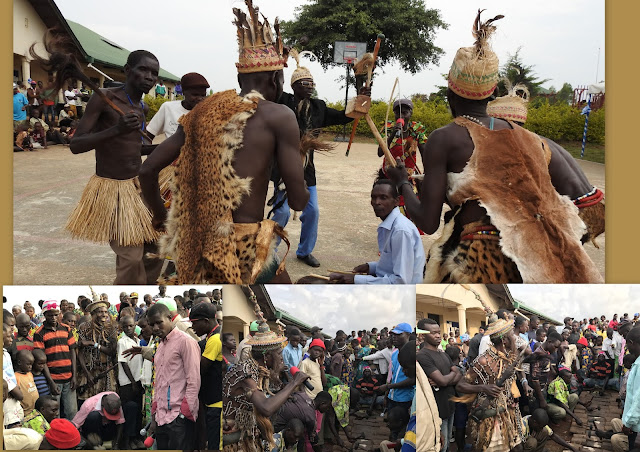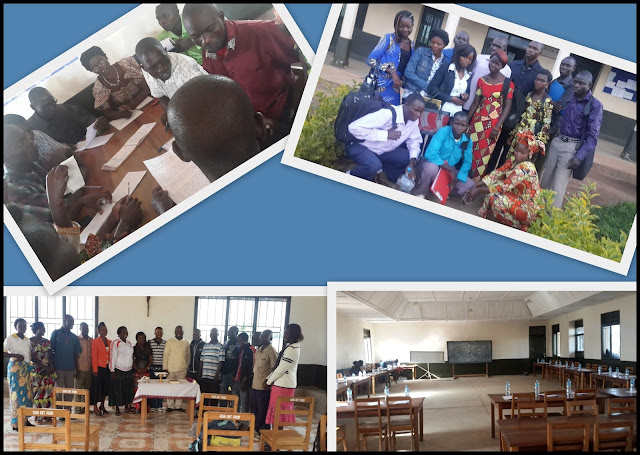February 11 is World Day for
the Sick (Catholic tradition), an observation started by St. John Paul II as a
way for us to offer support and prayers for those suffering from illnesses. To
think about people who are no long active because of physical weakness and
suffering. It is a day we pray and support those who suffer
from illness and for their caregivers. It was first observed on February 11,
1993. February 11 is also the Catholic Feast of Our Lady of Lourdes,
whose name is given to the Virgin Mary in honor of the apparitions that
were said to have been seen in and around Lourdes, France, by a young girl
called Bernadette Soubirous. The Church canonized Bernadette as a saint several
years later.
My aim is not really to give
the historical background of this day. I prefer we think of many people who are
sick in the hospitals and those who have died because they have no means of
going to the hospital. I think and pray for those who die in silence and
isolation because of lack of financial help. Sickness put an end to dreams. It
shortens our lives and projects.
We are useful from birth till
death.
We are still useful even when
we are on sick beds, wounded by human sufferings and some uncertainties of
life. People who are sick and weak need our presence and assistance. To
accompany the sick is not only meant for believers. It’s religious; it’s
human to care for sick people. Our positive attitudes towards the sick give
dignity to the human person despite his physical condition. We do this because
sickness has no boundaries. Believers fall sick and non believers also fall
sick either by growing old or my situations of life. What we need most when we
are sick is that “Healing presence of people around us”, people who are
there to comfort, to give hope and that sense of family care. Today people die
not only of old age. People commit suicide not only because life is unbearable
but because of isolation and abandon.

I had a chance of working in
the hospital (Pastoral of the sick) caring for the sick people. I was
challenged by human suffering and sickness. People ask questions and
question trying to make meaning out of human suffering and sickness. I remember
Theresa who was asking me while crying on her sick bed: “Fr! Why me, but why
me? What have I done wrong in life? I was silent, crying within me and
asking God the same question within me. I did not want to attempt answering
Theresa’s questions. These were existential questions but I had no good
response for her. I was satisfied that I was there trying to feel with her and
to offer some help to her. Today, Theresa is at peace with her Lord. She
was accompanied, she was considered even on her difficult moment. In
the same clinic I saw people sneezing and coughing, others are on drips hanging
for hours, some have food around them but have no appetite. Others are there
awaiting interventions while others just arrive to pick their dead bodies. It
is a painful experience but we have to be caregivers, people who give life and
hope to the sick.
In his speech, Pope Francis
has clearly mentioned the presence of the church in the pastoral care for the
sick:
“The Church’s maternal
vocation to the needy and to the sick has found concrete expression throughout
the two thousand years of her history in an impressive series of initiatives on
behalf of the sick. This history of dedication must not be forgotten. It continues
to the present day throughout the world. In countries where adequate public
health care systems exist, the work of Catholic religious congregations and
dioceses and their hospitals is aimed not only at providing quality medical
care, but also at putting the human person at the centre of the healing
process, while carrying out scientific research with full respect
for life and for Christian moral values. In countries where health
care systems are inadequate or non-existent, the Church seeks to do what she
can to improve health, eliminate infant mortality and combat widespread
disease. Everywhere she tries to provide care, even when she is not in a
position to offer a cure. The image of the Church as a “field hospital” that
welcomes all those wounded by life is a very concrete reality, for in some
parts of the world, missionary and diocesan hospitals are the only institutions
providing necessary care to the population.”
Our Attitude towards sick
people
What I have always admired in
Pope Francis is his deep faith and leadership qualities. The Roman pontiff
puts people in the center of the gospel. Here he comes again in his speech
for the world day for the sick: putting the human person at the centre
of the healing process….. Respect for life and for
Christian moral values. Our attitude towards the sick must aim at
sustaining life and saving life. Some theological explanation of human
suffering and death are not really the starting point in front of a sick and
dying patient. At times we are limited, unable to explain the mystery of
suffering and death. Questions, interrogations addressed to sick people are not
really important at that moment of despair. Tendencies to see sufferings and
sicknesses as a result of our own deliberate sin is judgmental and not important
in front of the sick. This attitude creates more wounds in the life of the
sick.
Accompany the sick.
Sick people need to be accompanied
and assisted. This legacy of the past says the pope should “helps us to
build a better future, for example, by shielding Catholic hospitals from the
business mentality that is seeking worldwide to turn health care into a
profit-making enterprise, which ends up discarding the poor. Wise organization
and charity demand that the sick person be respected in his or her dignity, and
constantly kept at the centre of the therapeutic process. This should likewise
be the approach of Christians who work in public structures; through their
service, they too are called to bear convincing witness to the Gospel”.
No to the culture of
Exclusion.
People are not tools or
utilities that are useful for a particular purpose and thrown away
when it cannot no longer perform. Man is not a machine to be used and dump.
Man/woman whose life begins from births and ends by death (Not forced or helped
to terminate his life) is needed when he is active as a youth and when he is
less active in his elderly age. He is useful and needed when he is sick and
when he is in good health. I believe love means COMMITMENT FOR LIFE. This
commitment has no limit, it is for life. We love with doubts, positive
attitude but also with the weaknesses of the other person. We love when we are
physically well and even when we are on wheel chairs. Sick people or those
mentally challenged are not strangers, they are not half-humans, they are not
burdens to the society. Our elders who are growing old are not burdens; they
are never unwanted objects to be excluded from our discussions, from out
meetings, from our families. I remember sharing with a friend on how we treat the
sick. In some families, sick people are at times closed in doors; we feel
disturbed by their presence. At times we give them “special places” isolated in
the same family.
They are our brothers
and sisters in need of our presence and healing touches. Exclusion kills, it
kills psychologically and finally physically. They die at times before time.
They die not because of disease but mostly because of isolation, mistreatment,
exclusion and stigmatization. Be a caregiver, give hope and support to a sick
friend today.
Peter
EKUTT






















